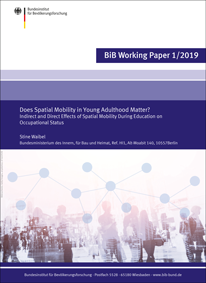Sonstige PublikationenDoes Spatial Mobility in Young Adulthood Matter?
Indirect and Direct Effects of Spatial Mobility During Education on Occupational Status
Waibel, Stine (2019)
BiB Working Paper 1/2019. Wiesbaden: Bundesinstitut für Bevölkerungsforschung
Spatial mobility after leaving high school for further education is a dominant part of the transition to adulthood and accounts for a large proportion of total internal migration dynamics. Yet, it has been neglected in studies of social mobility. This study explores the link between spatial mobility during post-secondary education (for distances of at least 50 km) and occupational status acquired three years after finishing education, once young adults have had time to settle in the labor market. Starting from a path model, the goal is to identify the average indirect effect of spatial mobility operating though the mediator education, situated on the path between spatial mobility and occupational status as well as the (unmediated) direct effect.
Direct and indirect effects are estimated via a novel inverse probability weighting (IPW) approach to account for the fact that selection into spatial mobility as well as into the mediator education is non-random and may bias the direct and indirect effect estimates. Analyses are based on nine waves of the Adult Cohort of the German National Educational Panel Study (NEPS), a representative, multi-cohort sample of German residents containing complete retrospective and prospective multidimensional information on individual life-courses. Contextual information on district-levels are matched with the data reflecting local educational opportunities when leaving high school as well as the degree of urbanization.
Findings show that the mobile population is a highly selective group predestined towards career success, because they are achievement-oriented from the beginning and because they enjoyed pro-educational family environments. Yet, an unmediated direct effect of spatial mobility on occupational status remains, even after accounting for confounding factors. Thus, this study indicates that taking advantage of educational opportunities at distant locations may be beneficial to the social mobility of young people beyond educational advancement. Moreover, the results point towards effect heterogeneity in that spatial mobility increases socio-economic positions especially for those with disadvantageous starting positions.

